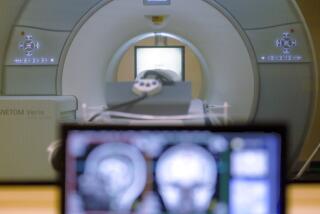Study Finds Depression Not a Cancer Cause
- Share via
Undermining a popular belief that depression can play a role in the development of cancer, a 10-year federal study has found that people who experience depression are no more likely than others to come down with the disease.
The finding, published today in the Journal of the American Medical Assn., contradicts a centuries-old hypothesis that has attracted new interest in recent years amid a growing curiosity about psychological factors in disease.
“These findings should diminish any concern that people have about (depression) being an important factor” in cancer, said Bernard Fox, a professor of psychiatry at the Boston University School of Medicine and an expert in the field.
Biologic Processes
“Overall, people should pay more attention to the biologic processes that stimulate cancer,” Fox said. “For example, by not eating too much fat . . . stopping smoking . . . or avoiding carcinogens like radon and (chemicals) in the workplace.”
The findings, by researchers at the National Institute on Aging, run counter to those of a now-famous study published in 1981 that found that men with evidence of a high rate of depression were twice as likely as others to develop or die of cancer.
Since that time, other researchers have reached conflicting conclusions. But specialists in the field say there is a widely held belief among the public that depression can somehow contribute to the onset of cancer.
“There is a danger, which is that people feel responsible for being sick,” said George Kaplan of the California Department of Health Services. “. . . I don’t think it’s particularly useful to have people feel . . . that they are responsible for this disease.”
“I think that we have to question whether it’s a given that states of mental distress cause cancer,” said David K. Wellisch, professor of medical psychology at UCLA School of Medicine. “Many people think that’s a given. This (study) reminds us that it’s not.”
The federal study looked only at the onset of cancer, not at survival among those already diagnosed with the disease. Researchers like Wellisch believe depression can play a critical role in accelerating the death of cancer patients.
“I see that as life-threatening and life-limiting,” Wellisch said, “because the patient who is depressed and who has cancer is . . . less prone to be able to cope with treatment and as a result faces greater risk of mortality.”
Stanford Findings
One recent study, reported in May by researchers at Stanford University, found that breast cancer patients who got emotional and social support through group therapy survived up to twice as long as patients on medical treatment alone.
In the current study, the federal researchers tracked 6,403 men and women who had taken part in a federal health and nutrition study in the early 1970s. All had been examined using two standard psychological tests to gauge mental health and depression, and their hospital records were obtained.
Of those participants who appeared to suffer repeatedly from depression, 11% were diagnosed with cancer or died of it during the 10-year period of the depression study. Of those considered not depressed, 10% were diagnosed or died.
The difference between 10% and 11% is not considered statistically significant.
“I think it’s pretty clear from our results that people who are experiencing symptoms of depression need not be concerned that their symptoms are a risk for cancer,” said Alan B. Zonderman, an author of the study and a psychologist at the National Institute on Aging.
“My feeling is that the load of evidence is consistent with either no real relationship or a very weak one,” said Fox of Boston University School of Medicine, who wrote an accompanying editorial published in the journal.
Suspicions of links between depression and cancer have existed at least since Galen, the 2nd-Century Greek physician and writer, researchers say. More recently, they received some support from observations and studies of people with serious psychiatric disorders.
The 1981 study, which involved 2,020 men employed by the Western Electric Co. in Chicago, stimulated new interest in the subject. Since that time, several studies have appeared to contradict the 1981 finding while others have partially supported it.
“There has been tremendous interest in that (1981) study,” said Kaplan, chief of California’s human population laboratory and the author of a contradictory study. Kaplan attributed that interest in part to the new field of so-called psychoneuroimmunology.
Nature of Field
Psychoneuroimmunology is the study of links between psychological states and the brain and the immune system. Researchers are exploring whether psychological conditions like bereavement can influence immune system functioning and one’s ability to ward off disease.
Why the studies have reached conflicting conclusions is unclear, researchers say. The answer may lie in methods used to measure depression. Different researchers have used different standardized tests, some of which may be insufficiently precise, researchers say.
Dr. Richard Shekelle, author of the 1981 study, said in a telephone interview Thursday that while his study supported the suggestion that depression “might promote the development and spread” of cancer, he never intended to assert it was a cause of the disease.





